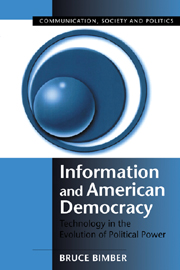Book contents
- Frontmatter
- Contents
- List of Figures and Tables
- Acknowledgments
- 1 Information and Political Change
- 2 Information Revolutions in American Political Development
- 3 The Fourth Information Revolution and Postbureaucratic Pluralism
- 4 Political Organizations in the Fourth Information Revolution
- 5 Political Individuals in the Fourth Information Revolution
- 6 Information, Equality, and Integration in the Public Sphere
- Select Bibliography
- Index
3 - The Fourth Information Revolution and Postbureaucratic Pluralism
Published online by Cambridge University Press: 19 December 2009
- Frontmatter
- Contents
- List of Figures and Tables
- Acknowledgments
- 1 Information and Political Change
- 2 Information Revolutions in American Political Development
- 3 The Fourth Information Revolution and Postbureaucratic Pluralism
- 4 Political Organizations in the Fourth Information Revolution
- 5 Political Individuals in the Fourth Information Revolution
- 6 Information, Equality, and Integration in the Public Sphere
- Select Bibliography
- Index
Summary
THE QUESTION OF INFORMATION ABUNDANCE
The capacities of competing political actors and organizations are most often measured by yardsticks involving money, staff, experience, and organization, but rarely information. The idea that democratic power tends to flow to the most well-endowed political actors, financially and organizationally, exerts a far-reaching influence on conceptions of politics and democracy. Much research on pluralism and interest group politics in the United States is based on the premise that financial and organizational requirements pose a barrier to national-scale collective action, and that in policy competition, those with more financial and organizational resources tend to prevail in the long run over those with fewer resources. The conclusion from the last chapter that policy and political influence tend to flow to the best informed provides an explanation for this resources–power relationship: Resources confer command over information and communication, and command over these enhances political influence.
This approach to explaining political power leads to an interesting question. Throughout the series of information revolutions and regimes thus far in American history, developments at each step have strengthened the link between resources and command of information, making organizational and financial infrastructure of one kind or another ever more important for facility with information and political communication. Information and communication have been comparatively scarce, costly, and unevenly available to political actors, and on this foundation historical developments in the complexity and organization of information have proceeded, facilitating in turn the evolution of parties, interest groups, and candidate organizations.
- Type
- Chapter
- Information
- Information and American DemocracyTechnology in the Evolution of Political Power, pp. 89 - 109Publisher: Cambridge University PressPrint publication year: 2003



